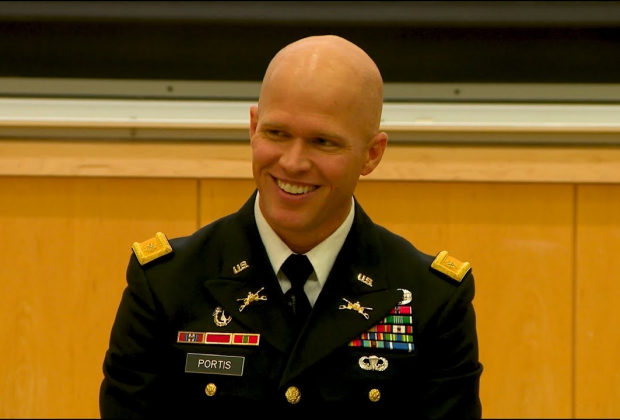Caldwell County troop’s war story headed to the big screen on Friday
By Wesley Gardner
LPR Editor
Even as a seven-year-old, Lieutenant Colonel Stoney Portis knew he wanted to attend West Point Military Academy.
“I must have seen a war movie or something and I got it in my head that’s that what I wanted to do,” said Portis, who was accepted to West Point after graduating from Lockhart High School. “My dad enlisted in the army in the sixties.
“His opinion was that if I was going to go, he wanted to make sure I was going to go to college, so he encouraged West Point.”
To Portis’ sister, PJ, it was of little surprise that he saw his dream come to fruition.
“He’s hard working,” said PJ. “He’s always been a really ambitious person, even when he was little. He rarely took no for an answer.”
According to PJ, Portis found ways to succeed even as a small child. Once, when he was in the third grade, he found an old spool of wire at his grandparent’s house and used it to start a small business selling the wire to his friends at school.
Currently, Portis is working on getting a doctorate in English at Duke University. After he wraps that up, he said he’ll be heading to Fort Stewart in Georgia, where he’ll serve as a battalion commander of an operational unit, meaning he’ll likely be deployed.
It wouldn’t be the first time Portis has seen battle, though. Far from it.
On October 3, 2009, approximately 300 Taliban fighters attacked COP Keating, a company-sized Combat Outpost in the Nurestan Province of Afghanistan. Portis, who was the troop commander, was at nearby FOB Bostick and had to fight his way back to help defend the outpost from what would go on to become an 18-hour firefight.
In the end, eight American soldiers were killed and 19 more were wounded.
“The first thing we did [after the battle] was we told our soldiers, ‘Hey, go call home. Go email, whatever you need to do. Just touch base and tell your family you’re all right,’” said Portis. “One of the soldiers emailed his family and said, ‘You know what, we’ve been through all this, and no one cares.’
“For me, that resonated for a long time … It’s emblematic of a nation that probably isn’t fully aware of what our soldiers are doing in Afghanistan, so I thought if I can tell their story and I can answer their questions, people are going to care.”
In 2012, CNN news host Jake Tapper released “The Outpost: An Untold Story of American Valor,” a nonfiction book chronicling the four years soldiers defended the base culminating with the battle Portis helped lead.
On Friday, a motion picture simply titled “The Outpost” will be released in select theaters around the globe and will be available to stream from your home the same day.
Portis spent a lot of time with Tapper, assisting him with the book, though he said he was a little more hesitant when he found out it was being adapted for film.
“When I first heard the book was going to be made into a film, that was the first time I ever really got worried,” said Portis. “Up until that point, we had had our agency in being able to tell our story the way we remembered it, but I also knew that a Hollywood flick can really embellish things, and even twist the narrative to bend toward a particular political argument.”
Portis said he called the director, fellow West Point graduate Rod Lurie, to voice his concerns.
“He listened,” said Portis “He just listened, and then at the end of the conversation he agreed to let me come out to the set and see a day of filming.”
In October of 2018, Portis joined Chris Cordova, who was a medic at the battle, to fly to Bulgaria to visit the set.
“[The set] was so life-like,” said Portis. “I grew light-headed and I felt tears welling up in my eyes.
“All these emotions and memories came rushing back from the last time that I saw combat at Outpost Keating. My friend Chris had a very similar experience. He was a doc for the camp, so when walked into the aide station, he almost broke down, because the last time he was in that aide station was for an 18-hour battle in which eight soldiers died and 19 were wounded, and he did everything he could to keep them alive.”
Portis said that while the experience was emotional for both of them, it was ultimately rewarding in at least one aspect.
“We went there, I think, probably because we had some kind of sense that we were going to help make sure [the film is] accurate, when in truth, the experience probably served as something that’s not all that dissimilar from exposure therapy,” said Portis. “There are World War II veterans and Vietnam veterans who will actually go to the sites of their traumatic battlefield experiences as a form of catharsis to put their post-traumatic stress behind them.
“This wasn’t exactly that because the outpost was a recreation and the soldiers were not soldiers. They were actors, but in spite of that fabrication, it engendered very authentic emotional responses from both of us.”
Portis said he’s seen the film in its entirety, noting he felt the director and actors did as good a job as they could at recreating the soldiers’ stories. That being said, Portis said he didn’t believe there was a such a thing as a true war story.
Quoting one of his favorite authors, Portis said, “’In the end, of course, a true war story is never about war. It’s about love and memory, and it’s about sorrow.’”
“[The film] unquestionably captures the love we felt for each other and the memories we shared, so I think that’s the power behind it,” Portis added.
Portis did point out one humorous point of contention between reality and the events depicted in the film.
“I’m a short, bald guy,” Portis said, laughing. “I’m like 5-foot-6 and 150 pounds, so I made a short-bald joke a few weeks into my conversations with the director, and he said, ‘Well, man. I don’t know how to tell you this, Stony, but the guy we just cast to play you is this kid named Trey Tucker’…He goes, ‘Stony, he’s like 6-2 and full of muscle and has jet-black hair. He looks like Superman.’
“I said, ‘Well, you’re going to have a lot of explaining to do then.’”
Reflecting on his last deployment, Portis said he spent a lot of time thinking about home.
“It’s hard to overstate the mark that your hometown leaves on you, even when you leave your hometown,” said Portis. “For me, Lockhart is the place that I always come home to.
“When I think about these things that I’m doing – when I’m in Iraq or Afghanistan or the Philippines or Korea – and people start talking about home, I think about Lockhart. Specifically, I think about Clear Fork Elementary. That’s where I spent the formative years of my life. My mom taught there.”
Portis noted he visited his old elementary school the last time he went home to attend a ceremony dedicating a tree to his mother, a gesture he said really moved him.
“If there’s a foundational character trait that I hope I can cultivate in my children, it’s to appreciate the wholesome goodness that places like Lockhart espouse.”
The Outpost will be available to stream nationwide beginning Friday. The nearest theater screening the film will be Doc’s Drive In Theatre in Buda. Theaters in Austin will also screen the film.



